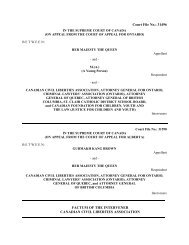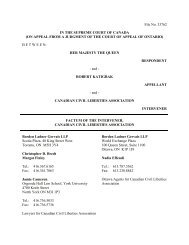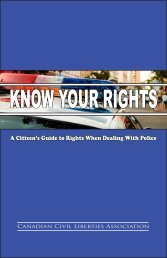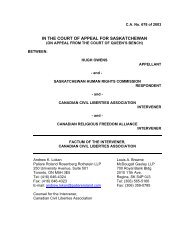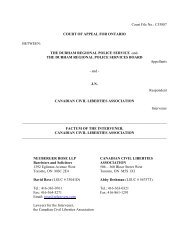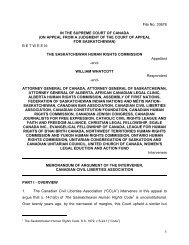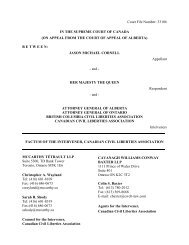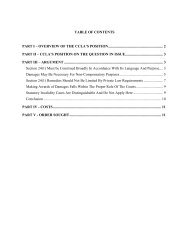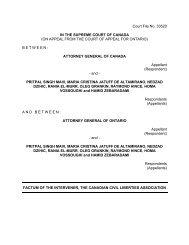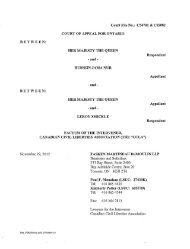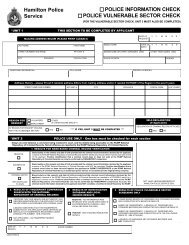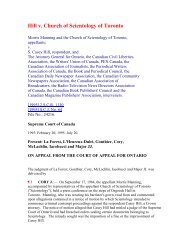The Fundamentals of Our Fundamental Freedoms - Canadian Civil ...
The Fundamentals of Our Fundamental Freedoms - Canadian Civil ...
The Fundamentals of Our Fundamental Freedoms - Canadian Civil ...
Create successful ePaper yourself
Turn your PDF publications into a flip-book with our unique Google optimized e-Paper software.
<strong>The</strong> <strong><strong>Fundamental</strong>s</strong> <strong>of</strong> <strong>Our</strong> <strong>Fundamental</strong> <strong>Freedoms</strong><br />
by A. Alan Borovoy<br />
is published by:<br />
<strong>The</strong> <strong>Canadian</strong> <strong>Civil</strong> Liberties Education Trust<br />
200 - 394 Bloor Street West<br />
Toronto, ON M5S 1X4<br />
Canada<br />
phone: 416-363-0321<br />
fax: 416-861-1291<br />
E-mail: education@ccla.org<br />
website: www.ccla.org<br />
This booklet is also available in French. Please contact CCLET at the above<br />
number for information.<br />
Please feel free to download and copy portions as needed for class use from<br />
www.ccla.org/schools.<br />
THE FREEDOM OF NO ONE IS SAFE<br />
UNLESS<br />
THE FREEDOM OF EVERYONE IS SAFE<br />
[charitable registration BN 10684 4384 RR0001]
PREFACE<br />
Since the early nineteen-seventies, <strong>Canadian</strong>s<br />
have been tested, perhaps as never before,<br />
regarding their fundamental beliefs about the<br />
democratic system.<br />
●<br />
●<br />
As a society, we have long proclaimed the<br />
centrality <strong>of</strong> civil liberties. But, in<br />
October <strong>of</strong> 1970, the overwhelming<br />
majority <strong>of</strong> <strong>Canadian</strong>s approved the<br />
invocation <strong>of</strong> the War Measures Act which<br />
suspended their civil liberties. <strong>Canadian</strong>s<br />
had reacted in fear to the kidnapping <strong>of</strong><br />
British Trade Commissioner James Cross<br />
and Quebec Labour Minister Pierre<br />
Laporte by the terrorist Front de<br />
Liberation du Quebec (FLQ). In response,<br />
the government made it an <strong>of</strong>fence simply<br />
to advocate FLQ policies and merely to be<br />
a "member" <strong>of</strong> the FLQ. <strong>The</strong> government<br />
also increased the powers <strong>of</strong> the police to<br />
search and seize, arrest and detain, without<br />
warrant or bail. <strong>Our</strong> belief in civil liberties<br />
came into conflict with our felt need to<br />
ensure the very survival <strong>of</strong> our system.<br />
Although we have always pr<strong>of</strong>essed a<br />
belief in the importance <strong>of</strong> the rule <strong>of</strong> law,<br />
many <strong>of</strong> us rather complacently accepted<br />
what we learned in the late nineteenseventies<br />
about the long history <strong>of</strong><br />
unlawful misdeeds on the part <strong>of</strong> the Royal<br />
<strong>Canadian</strong> Mounted Police (RCMP).<br />
Despite the revelation that RCMP<br />
members had participated in burglary,<br />
theft, arson, mail-opening, assault, and<br />
the invasion <strong>of</strong> tax files — many <strong>of</strong> these<br />
for more than thirty years — not one<br />
<strong>of</strong>ficer has ever been charged outside the<br />
province <strong>of</strong> Quebec. <strong>The</strong>se illegalities<br />
were regarded as vital to the interests <strong>of</strong><br />
national security and law enforcement.<br />
Thus, our belief in the rule <strong>of</strong> law came<br />
into conflict with our felt need to be<br />
protected from spies, terrorists, and drug<br />
traffickers.<br />
●<br />
●<br />
●<br />
We have long proclaimed the importance<br />
<strong>of</strong> free speech. But, since the nineteenseventies,<br />
there has been growing support<br />
for the idea <strong>of</strong> prosecuting hate mongers.<br />
An increasing number <strong>of</strong> <strong>Canadian</strong>s are<br />
not prepared to tolerate publications that<br />
deny the reality <strong>of</strong> the Nazi Holocaust<br />
against the Jews or assert the inferiority <strong>of</strong><br />
Blacks. <strong>Our</strong> belief in freedom <strong>of</strong> speech<br />
has come into conflict with our belief in<br />
racial and ethnic dignity.<br />
We have long believed in the presumption<br />
<strong>of</strong> innocence: no persons should be<br />
punished unless a fair trial finds that they<br />
have committed a crime. But, in the<br />
1990s, a new law has empowered the<br />
courts to restrict the lawful activities <strong>of</strong><br />
those who, it is reasonably believed, will<br />
commit gang-related <strong>of</strong>fences, even<br />
though they have not been convicted <strong>of</strong> —<br />
or even charged with — any such <strong>of</strong>fence.<br />
<strong>Our</strong> belief in the presumption <strong>of</strong> innocence<br />
came into conflict with our desire to<br />
protect society from biker gang violence.<br />
<strong>Our</strong> society has long believed in fundamental<br />
legal safeguards. But after the<br />
terrorist calamities <strong>of</strong> September 11th,<br />
2001, the government <strong>of</strong> Canada began to<br />
promote a number <strong>of</strong> exceptional measures:<br />
– a period <strong>of</strong> imprisonment without<br />
conviction or even charge;<br />
– a requirement to provide certain<br />
assistance to police investigations;<br />
– an obligation on people to tell the<br />
authorities when they come into<br />
possession <strong>of</strong> property belonging to a<br />
terrorist group;<br />
– a power, without trial, to label those<br />
considered to be terrorist groups and a<br />
duty on the part <strong>of</strong> everyone else to<br />
avoid certain dealings with such<br />
groups.
<strong>Our</strong> commitment to legal safeguards came into<br />
conflict with our determination to eradicate<br />
terrorism.<br />
This is not necessarily to take sides on the above<br />
issues. It is, rather, to recognize how such issues<br />
challenge the very core <strong>of</strong> our beliefs. It is also<br />
to recognize how much more frequently than ever<br />
before, we are being required to face such<br />
challenges.<br />
One disturbing factor has emerged from all these<br />
conflicts. As a people, we <strong>Canadian</strong>s have not<br />
been adequately prepared to address such issues.<br />
<strong>Our</strong> schools and educational system have spent<br />
too little time and effort exploring the<br />
philosophical underpinnings <strong>of</strong> what democracy<br />
is supposed to be about. This realization<br />
mobilized the <strong>Canadian</strong> <strong>Civil</strong> Liberties Education<br />
Trust. Since the very purpose <strong>of</strong> our organization<br />
is to strengthen the commitment to democracy,<br />
we thought it useful to create a primer on this<br />
subject for the schools.<br />
While there is an increase on the <strong>Canadian</strong><br />
market today in the number <strong>of</strong> publications<br />
which attempt to explain existing legal rights<br />
under various statutes, this publication attempts<br />
to explain the philosophy <strong>of</strong> the democratic<br />
system itself. Of course, a subject as complex as<br />
the philosophy <strong>of</strong> democracy requires volumes.<br />
A primer can hope only to introduce basic<br />
concepts with the aim <strong>of</strong> stimulating its readers to<br />
further exploration and thought.<br />
In the interests <strong>of</strong> simplicity and brevity, we have<br />
attempted to confine our subject matter to the<br />
bare bones <strong>of</strong> the democratic ideal as that ideal<br />
has evolved in the common law countries <strong>of</strong> the<br />
Western world. We examine here only the<br />
minimum relations that must exist between the<br />
individual and the state. Fortunately, most<br />
common law democracies <strong>of</strong> the Western world<br />
provide far more. But no common law<br />
democracy, worthy <strong>of</strong> its traditions, can accept<br />
much less.<br />
Acknowledgments<br />
This publication owes its<br />
existence to Jim MacDonald <strong>of</strong><br />
the <strong>Canadian</strong> Labour Congress<br />
for first suggesting the idea and<br />
to the Law Foundation <strong>of</strong><br />
Ontario for a generous grant<br />
that enabled us to act on the<br />
idea. We are pr<strong>of</strong>oundly<br />
grateful.<br />
– <strong>The</strong> Trustees <strong>of</strong> the <strong>Canadian</strong> <strong>Civil</strong><br />
Liberties Education Trust.<br />
December, 2001
<strong>The</strong> <strong><strong>Fundamental</strong>s</strong> <strong>of</strong> <strong>Our</strong> <strong>Fundamental</strong> <strong>Freedoms</strong><br />
is published with the assistance <strong>of</strong> a grant from<br />
<strong>The</strong> Law Foundation <strong>of</strong> Ontario



